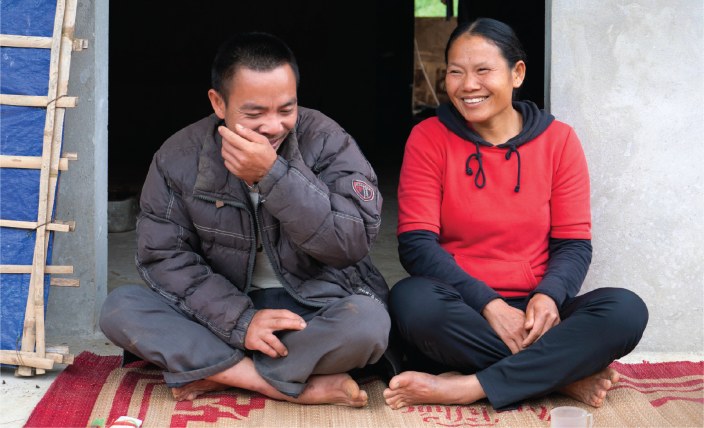“I am still rough around the edges, but I never raise my hand against my wife anymore.”
After enduring over a decade of domestic abuse, Ne’s desperate thought, "Perhaps I should just die, living like this is too painful!" marks a poignant reminder of her suffering. Married at 16 to Tho, their life in an economically challenged and isolated household in Hoa Binh was marred by violence and despair. Her story is a window into many other silent struggles that the "Effective cooperation for the rights of legal aid & legal consultancy of the poorest ethnic minority community" initiative seeks to address.
In Hoa Binh province, the initiative, led by the Research Center for Initiatives in Community Development (RIC) stands as a testament to the power of legal access among Vietnam's most vulnerable communities, particularly the ethnic minorities. The initiative strategically leverages a multi-sectoral collaboration, engaging various governmental departments like the Department of Labor, Invalids and Social Affairs (DOLISA) to tackle gender equality issues and enhance legal capacities at the community level. This collaboration aims to establish a framework for inter-departmental cooperation in Hoa Binh, and build robust policies and community engagement mechanisms to address local issues of violence and abuse.
A core part of the strategy involves establishing a Core Action Group, consisting of 12 members from different sectors, including DOLISA, the Department of Justice, and other mass and socio-political organizations. This group is tasked with researching and reviewing existing collaborations, formulating integrated action plans, and enhancing communication, legal education, and support at the local level.
In turn, the Core Action Group (CAG) conducts training sessions on improving awareness and understanding of laws concerning domestic violence, children's rights, and family welfare for Core Community Groups. These sessions aim to enhance advisory skills and legal knowledge among community leaders, so that they can implement widespread legal education and direct legal counseling within the community. These groups are crucial in translating theoretical legal knowledge imparted by the CAG to meet the specific needs of community members, thereby enhancing their ability to navigate and utilize their legal rights effectively.
Xien, once a reserved individual indifferent to legal matters, has become a key community legal communicator. Her transformation highlights the personal and communal growth stemming from these initiatives. She reflects, "Before, I would switch the channel whenever legal issues came on TV. Now, I understand the struggles of our people, and I'm actively involved in helping resolve them."
Xien's efforts in organizing group discussions where she regularly meets with families to address their legal issues, exemplify the project's grassroots approach. These meetings also foster a supportive community network that encourages open discussions and collective problem-solving.
The outcomes of this initiative are compelling: 233 people received direct legal counseling and support, leading to an overall improvement in legal access for 1,316 individuals, including a substantial number of women and ethnic minorities. This success is integrated into Hoa Binh’s provincial strategy, enhancing family happiness and child protection efforts from 2021 to 2025.
Revisiting the lives of Ne and Tho reveals a transformed relationship characterized by understanding and mutual respect. "Life was hard, and my thoughts were shallow,” Tho shares. “I didn't realize my actions were illegal. Now, thanks to the advice, I know better. I am still rough around the edges, but I never raise my hand against my wife anymore." This change was facilitated by the persistent efforts of the community group, who engaged the couple through gradual discussions about domestic violence. The couple’s home, once filled with strife, now resonates with laughter and caring conversations.
The success of RIC's initiative in Hoa Binh underscores the critical roles of grassroots community groups and multi-sectoral cooperation in driving sustainable change. The initiative is supported through funding from JIFF and benefits from preliminary training and consultation provided by the JIFF Secretariat. The focus of this support encompasses gender mainstreaming, strategic communication, project management, and a rights-based approach to legal aid. Additionally, JIFF conducts midterm reflections to evaluate the progress and advise on future steps and sustainability of the initiative.
